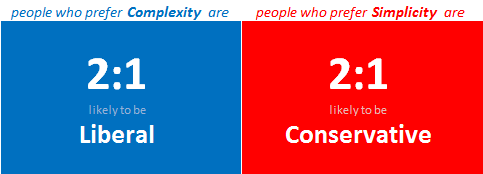The Freakonomics blog discusses political bias in sciences, and quotes a social psychologist who estimated that 80% of attendees at a conference were liberals (he asked for a show of hands). Dubner seems worried that political views will shape research conclusions, and writes:
How can it be that an academic field is so politically homogeneous? What kind of biases does such homogeneity produce? What sort of ideas get crowded out? And how homogeneous are other disciplines?
I have to say that I was surprised at the overt political (leftward) bias exhibited by several prominent economists at the recent American Economics Association meetings, although my sample set was quite small.
It is interesting — and sobering — that two fields, psychology and economics, that we rely upon to describe and amend bias in the world are themselves so susceptible to bias within the ranks of their practitioners.
Krugman disagrees, implying that research conclusions probably push attitudes towards the liberal side, saying
Biologists, physicists, and chemists are all predominantly liberal; does this reflect discrimination, or the tendency of people who actually know science to reject a political tendency that denies climate change and is broadly hostile to the theory of evolution?
Now, I don’t mean to say that political bias in the academy is absent, although it’s not consistent: I can well imagine that it’s hard to be a conservative in some social sciences, but in economics, the obvious bias in things like acceptance of papers at major journals is towards, not against, a doctrinaire free-market view. But the point is that doing head counts is a terrible way to assess that bias.
It might be that the most recent amusing statistical post on the blog for dating service OK Cupid has the answer. The post analyzes its database to identify the most unthreatening, innocent questions that best predict characteristics that you may not want to ask about directly (whether they’re religious, would have sex on a first date, their political ideology etc.). Based on their national US data they write that the question identifying politics is
- Do you prefer the people in your life to be simple or complex?
Because...

We were very surprised to find that this one question very strongly predicts a person's ideas on these divisive issues:
Should burning your country's flag be illegal?
Should the death penalty be abolished?
Should gay marriage be legal?
Should Evolution and Creationism be taught side-by-side in schools?
In each case, complexity-preferrers are 65-70% likely to give the Liberal answer. And those who prefer simplicity in others are 65-70% likely to give the Conservative one.
Seems to me that this is pretty consistent with the “bias” in academia. Academia is often very much concerned with complexity – finding nuances in interpretations and methods, considering alternative explanations for patterns in data, etc. If you prefer simplicity as a general trait in people and thoughts you would probably be pretty frustrated as an academic. And a 2:1 ratio is roughly 66%, which isn’t that far away from the estimate of 80% that we started with.
Sidenote: Interesting that Dubner is so worried by the left-wing attitudes of economists he encountered, given that his freakonomics podcast on how the world would look if it was driven by the gloriously rational economists basically said they would implement Milton Friedman’s pretty libertarian proposals. His (presumably unbiased and representative?) economist picked to answer on the behalf of the profession was Russ Roberts at George Mason University, who answered that his policy program would
start with some obvious things. I would get rid of the Department of Commerce. The Department of Commerce doesn’t do anything except subsidize exports, which is just a way of saying it makes certain companies rich at the expense of the rest of us. So I don’t think the Department of Commerce does anything particularly useful, I would get rid of that. I’d get rid of the Department of Education. I don’t think that the Federal Government has any productive role to play in the school system. I’d get rid of all tariffs. I’d let people be free to buy whatever they wanted from all around the world. What else? I would get rid of the minimum wage law, which I think makes it hard for low-skilled people to find work; it makes them artificially expensive. I’d change the Federal Reserve. We spend a lot of time trying to find the right interest rate. That’s a fool’s game that has contributed to the current crisis. So I would change the Federal Reserve. I would certainly at a minimum require it to only care about price stability. Right now it cares about price stability, unemployment, the health of the stock market, Wall Street salaries, evidently. So I would get all of those things out. It’s going to be hard to do legislatively, so I would probably replace the the Fed with a Friedmanite fixed growth and money supply or just abolish it entirely and let private money emerge. I’m getting out of control here.
You don’t say…
Update: More links and discussion here from McArdle in the Atlantic. Her take seems to be that there is a bias, that it is amusing to see conservatives (usually dismissive of bias accusations) believe it and liberals (usually sympathetic to bias accusations) dismissive, that it is unsolvable, and that we should all just try harder to get along and see each other's point of view.
No comments:
Post a Comment